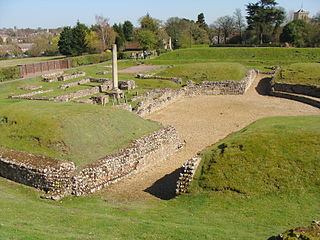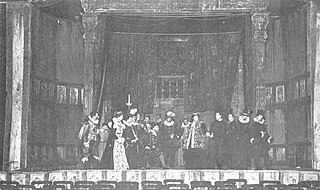Related Research Articles

The Tragedy of Hamlet, Prince of Denmark, often shortened to Hamlet, is a tragedy written by William Shakespeare sometime between 1599 and 1601. It is Shakespeare's longest play. Set in Denmark, the play depicts Prince Hamlet and his attempts to exact revenge against his uncle, Claudius, who has murdered Hamlet's father in order to seize his throne and marry Hamlet's mother. Hamlet is considered among the "most powerful and influential tragedies in the English language", with a story capable of "seemingly endless retelling and adaptation by others". It is widely considered one of the greatest plays of all time. Three different early versions of the play are extant: the First Quarto ; the Second Quarto ; and the First Folio. Each version includes lines and passages missing from the others.

William Shakespeare was an English playwright, poet and actor. He is widely regarded as the greatest writer in the English language and the world's pre-eminent dramatist. He is often called England's national poet and the "Bard of Avon". His extant works, including collaborations, consist of some 39 plays, 154 sonnets, three long narrative poems and a few other verses, some of uncertain authorship. His plays have been translated into every major living language and are performed more often than those of any other playwright. Shakespeare remains arguably the most influential writer in the English language, and his works continue to be studied and reinterpreted.

The English Renaissance theatre or Elizabethan theatre was the theatre of England from 1558 to 1642. Its most prominent playwrights were William Shakespeare, Christopher Marlowe and Ben Jonson.

The Tragedy of Julius Caesar (First Folio title: The Tragedie of Ivlivs Cæsar), often shortened to Julius Caesar, is a history play and tragedy by William Shakespeare first performed in 1599.

Drama was introduced to Britain from Europe by the Romans, and auditoriums were constructed across the country for this purpose.

Richard Burbage was an English stage actor, widely considered to have been one of the most famous actors of the Globe Theatre and of his time. In addition to being a stage actor, he was also a theatre owner, entrepreneur, and painter. He was the younger brother of Cuthbert Burbage. They were both actors in drama. Burbage was a business associate and friend to William Shakespeare.

The Folger Shakespeare Library is an independent research library on Capitol Hill in Washington, D.C., United States. It has the world's largest collection of the printed works of William Shakespeare, and is a primary repository for rare materials from the early modern period (1500–1750) in Britain and Europe. The library was established by Henry Clay Folger in association with his wife, Emily Jordan Folger. It opened in 1932, two years after his death.
James Burbage was an English actor, theatre impresario, joiner, and theatre builder in the English Renaissance theatre. He built The Theatre, the first permanent dedicated theatre built in England since Roman times.

The Curtain Theatre was an Elizabethan playhouse located in Hewett Street, Shoreditch, just outside the City of London. It opened in 1577, and continued staging plays until 1624.
The Lord Chamberlain's Men was a company of actors, or a "playing company", for which William Shakespeare wrote during most of his career. Richard Burbage played most of the lead roles, including Hamlet, Othello, King Lear, and Macbeth. Formed at the end of a period of flux in the theatrical world of London, it had become, by 1603, one of the two leading companies of the city and was subsequently patronized by James I.

The Oregon Shakespeare Festival (OSF) is a regional repertory theatre in Ashland, Oregon, United States, founded in 1935 by Angus L. Bowmer. The Festival now offers matinee and evening performances of a wide range of classic and contemporary plays not limited to Shakespeare. During the Festival, between five and eleven plays are offered in daily rotation six days a week in its three theatres. It welcomed its millionth visitor in 1971, its 10-millionth in 2001, and its 20-millionth visitor in 2015.

Harley Granville-Barker was an English actor, director, playwright, manager, critic, and theorist. After early success as an actor in the plays of George Bernard Shaw, he increasingly turned to directing and was a major figure in British theatre in the Edwardian and inter-war periods. As a writer his plays, which tackled difficult and controversial subject matter, met with a mixed reception during his lifetime but have continued to receive attention.

Shakespeare's Globe is a reconstruction of the Globe Theatre, an Elizabethan playhouse first built in 1599 for which William Shakespeare wrote his plays. Like the original, it is located on the south bank of the River Thames, in Southwark, London. The reconstruction was completed in 1997 and while concentrating on Shakespeare's work also hosts a variety of other theatrical productions. Part of the Globe's complex also hosts the Sam Wanamaker Playhouse for smaller, indoor productions, in a setting which also recalls the period.

Shakespeare's plays are a canon of approximately 39 dramatic works written by the English poet, playwright, and actor William Shakespeare. The exact number of plays as well as their classifications as tragedy, history, comedy, or otherwise is a matter of scholarly debate. Shakespeare's plays are widely regarded as among the greatest in the English language and are continually performed around the world. The plays have been translated into every major living language.

William Poel was an English actor, theatrical manager and dramatist best known for his presentations of Shakespeare.

A boy player was a male child or teenager who performed in Medieval and English Renaissance playing companies. Some boy players worked for adult companies and performed the female roles, since women were not allowed to perform on the English stage during this period. Others worked for children's companies in which all roles, not just the female ones, were played by boys.

Othello is the titular protagonist in Shakespeare's Othello. The character's origin is traced to the tale "Un Capitano Moro" in Gli Hecatommithi by Giovanni Battista Giraldi Cinthio. There, he is simply referred to as the Moor.

Thousands of performances of William Shakespeare's plays have been staged since the end of the 16th century. While Shakespeare was alive, many of his greatest plays were performed by the Lord Chamberlain's Men and King's Men acting companies at the Globe and Blackfriars Theatres. Among the actors of these original performances were Richard Burbage, Richard Cowley, and William Kempe.

Theatre of United Kingdom plays an important part in British culture, and the countries that constitute the UK have had a vibrant tradition of theatre since the Renaissance with roots going back to the Roman occupation.

Professor Thomas J. King Jr. was an educator, and an early user of word processing and sequence analysis to compare available early versions of William Shakespeare's plays for identification of variant texts and their analysis. Dr. King's historical work also researched original prompt copies of Elizabethan Era and Jacobean Era plays contemporary to Shakespeare, along with their marginalia, in order to identify stage directions and infer physical staging of Shakespeare's plays at the Globe and other London venues, as well as at provincial halls and inns where Elizabethan troupes performed on tour. In his extensive studies, Prof. King created databases of every Shakespeare play and other extant Elizabethan contemporary playhouse documents, by scene and character, to determine number of lines, and therefore the roles that could be doubled with sufficient time between for costume change, thus enabling him to determine the size of a working Elizabethan theater company.
References
- ↑ Mazer, Cary M. (2015). Double Shakespeares: Emotional-Realist Acting and Contemporary Performance. Fairleigh Dickinson University Press. ISBN 978-1-61147-843-3 . Retrieved 10 November 2024.
- ↑ Mazer, Cary M. (1981). Shakespeare Refashioned: Elizabethan Plays on Edwardian Stages. Ann Arbor: UMI Research Press. ISBN 0835712362 . Retrieved 10 November 2024.